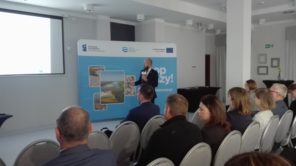In terms of available surface water resources, the Zachodniopomorskie Voivodeship has the second lowest level in Poland. During public consultations on the Drought Effects Counteracting Plan (DECP) draft, held on 8 October in Szczecin, actions taken by the State Water Holding Polish Waters aimed at improving this situation were discussed.
‘We are halfway through our series of nationwide consultation meetings concerning the Drought Effects Counteracting Plan draft. The debates held to date clearly show that any activities aimed at fighting drought must be adapted to the specific conditions in a given region. Only through such an approach can we achieve a synergy effect on a national scale and move even closer to attaining success in counteracting the dangerous effects of this phenomenon’ – explained Marek Gróbarczyk, Minister of Maritime Economy and Inland Navigation.‘Since the supply of available water resources in rivers and lakes of the Zachodniopomorskie Voivodeship is severely limited, we had to take appropriate corrective measures to resolve this issue. We focused primarily on renewing the area’s natural water retention potential. Research shows that the region’s potential in this regard is enormous and although natural retention measures may not appear as spectacular as constructing water reservoirs, their effectiveness is very high nonetheless. Increasing water retention of soil by only 10mm results in an additional 100 cubic metres of water per hectare!’ – the minister said.
To further prove that, Przemysław Daca, the president of the State Water Holding Polish Waters, drew on the example of the Biebrza river. ‘Its valley contains nearly 50 million cubic metres of water from melted snow – that equals 40% of Lake Dąbie’s total volume. This water, retained in the local soil, forests and wetlands, feeds the river during periods with little to no precipitation, whereby minimising the impact of droughts on the local residents, businesses and the natural environment itself. Activities aimed at improving natural retention are also vital since apart from mitigating the negative effects of drought, they also improve the quality of our surface and underground water’ – he explained.
As part of the DECP, the Polish Waters holding plans to implement a total of seven investment projects related to the construction, extension and reconstruction of water facilities in the Zachodniopomorskie Voivodeship. Three of them are related to restoring the water retention capacity in lakes and rivers. The following lakes will be subject to such activities: Morzycko, Kościuszki, Kościelne, Korytowo, Raduń, Gągnowo, Trzygłowskie Drugie. The following rivers: Stuchowska Struga and Płonia. The following canals: Jamieński Nurt, Łabędzie Bagno, Ina, Radew (Morgowo Canal, Ina, Radew). In addition to this, it is planned that fish migration routes will be restored as well. The four remaining activities are all about increasing retention through the reconstruction of weirs and the construction of small reservoirs. These include a facility to regulate the flow of the Rega river between Kłodkowo and Gąbin (valley retention), improving retention in the Uniesta and Polnica river basins and stabilising the water level in Lake Kiełpino.
The consultation meeting in Szczecin was the eighth in a series of fifteen debates on different aspects of drought prevention across the country organised as part of the DECP project. The public consultation phase will last six months (visit www.stopsuszy.pl for more information on consultation meetings held as part of the programme). The DECP is the first such comprehensive project on counteracting the effects of drought in Poland. Information about the DECP project is available at www.stopsuszy.pl and www.konsultacjesusza.pl. You can also submit applications and comments to the DECP programme through a special form available there.
The DECP document, which will be the most important product of the Stop drought! project, as well as the water and flood risk management plans, will greatly contribute to improving the water management processes in Poland. Following the public consultations, the DECP project will undergo a strategic environmental impact assessment. Following this, in 2020, the final step will be to formally adopt the project via a regulation prepared by the minister responsible for water management.
The President of the SWH Polish Waters is obliged to prepare a drought effects countermeasure plan due to the provisions of art. 240 par. 2. pt. 8) of the Act of 20 July 2017 – Water Law (Dz.U. of 2018, item 2268). So far, as part of the Stop drought! project, a DECP preparation methodology was created and a survey was conducted of 3,500 entities related to water management. In addition to this, the draft plan of the project was presented at national expert conferences and as part of the ‘Remember about water!’ social campaign. All works are financed via European funds (OPI&E 2014-2020).
Find out more here: www.stopsuszy.pl, www.wody.gov.pl and www.konsultacjesusza.pl.



Great info and right to the point. I am not sure if this is really the best place to ask but do you people have any ideea
where to get some professional writers? Thanks in advance 🙂 Lista escape room
Very interesting info!Perfect just what I was searching for!.
Thank you for your sharing. I am worried that I lack creative ideas. It is your article that makes me full of hope. Thank you. But, I have a question, can you help me?
This site was… how do you say it? Relevant!! Finally I have found something that helped me. Many thanks!
Howdy! I could have sworn I’ve been to your blog before but after going through a few of the articles I realized it’s new to me. Regardless, I’m definitely happy I found it and I’ll be book-marking it and checking back regularly!
Wonderful post! We are linking to this great post on our website. Keep up the great writing.